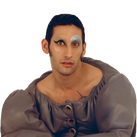After one of Britain's first gay Muslim marriages, let me tell you what it's actually like to be a gay Muslim
While many practicing Muslims reject homosexuality, the intersection of queer identity and faith is a reality for many of us

This week, Britain celebrated one of its first same-sex Muslim marriages. Jahed Choudhury, 24 – who identifies as both gay and Muslim – married his partner in an Islamic ceremony, even though his family refused to attend. As a gay person raised Muslim, I was thrilled to read of this news (and was inspired by Choudhury’s bravery). In Islamic teachings, I was taught from a young age to constantly chart all my sins, and was forced to imagine myself in the pits of hell for all my transgressions. Homosexual desire was of course a one-way-express ticket to fiery torture.
And if I, like Choudhury, ceremonially married a man, would not see my family there. Muslim social conduct would stop most of them from coming. When my parents discovered I was gay – through pornography no less – they were distraught, our relationship fell apart, and they did everything they could to "stop it." This included throwing away all my colourful clothes, which I was emotionally very attached to. But this felt much more to do with their cultural association with Islam – their fear of what relatives would think – rather than anything to do with Islamic scripture.
Many argue that to be gay and Muslim is an utter irreconcilability – “no Muslim is gay” was a remark I saw on Twitter today. When one learns that The Muslim Council of Britain opposed same-sex marriage in 2013, we understand how these views are generated.
However, homosexuality as a taboo among families and faith is hardly specific to Islam. Whilst I saw Christians at Pride celebrating both their faith and sexuality at the parade, I also witnessed a Christian group protesting same-sex relationships behind them. Homosexuality has hardly been a walk in the park for Catholics, and same-sex marriage is still illegal in Northern Ireland (the DUP-coalition suggests the Tories don’t much seem to care). Yet when same-sex marriages do occur in Christian contexts, the Western response is often one of relief, not incredulity – an “ah yes, finally,” rather then a “no way?! Not possible!”
While many practicing Muslims reject homosexuality, the intersection of queer identity and faith is a reality for many of us. I now characterise myself as an "agnostic Muslim." I don't follow scripture or practice, but in many facets of my life – whether in my drag family, my spiritual connection to the world, or just instilled moral values – I think I hold deep some Islamic principles (even a connection to Allah). And this connection sits separate to the "Muslim" communities that I'm no longer accepted in.
Umber Ghauri, who identifies as pansexual, agender and Muslim, talks to me about their perspective as a queer British Muslim. They tell me that Islam can be explored through a variety of perspectives, explaining that “Islamic history in Arab regions shows clearly that Muslims were among the most progressive people in terms of gender justice, racial equality, class politics and law. Muslim women were among the first in the world to vote, own property, run businesses, have the right to divorce.” It is this facet of Islam that Umber has an alliance with, and as such, being Muslim is a progressive part of their character.
Similarly, a poet and journalist in the Middle East – who identifies as bisexual and Muslim – explains how media representation erases the complexity of her identity – “my voice, my identity, is one that is erased and rewritten on a daily basis, whitewashed through generous doses of stereotype and bigotry…I want to scream PEOPLE ARE NOT ONLY WHAT YOU IMAGINE THEM TO BE.”
I’m not meaning to pretend that being queer and Muslim is an easy marriage. Homosexuality is criminalised in many Muslim nations, and they are home to some devastating LGBTQI+ hate crimes. But we need to remember that a religion is not a cultural model – it is a personal and individual relationship with God that can be practiced outside of socio-cultural norms.
As we have become more celebratory of sexual and gender autonomy in Western faiths, we need to do the same for Muslims; many of whom identify as queer and have a spiritual relationship with Allah, regardless of cultural conflicts. And so I commend Choudhury and his partner Sean Rogan for demonstrating that the different facets of their identities are not irreconcilable. I hope this persuades non-Muslims and Muslims everywhere that being a queer person of faith is a happy possibility.
Join our commenting forum
Join thought-provoking conversations, follow other Independent readers and see their replies
Comments